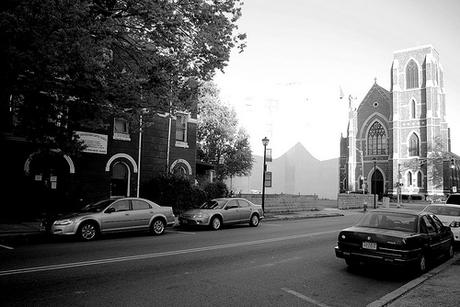In view of my current inquiry in the Reverend President's eulogy for Clementa Pinckney I thought I'd bump this to the top of the pile.* * * * *

The other day I made a post about a church service I’d recently attended, remarking both on the power of the pastor’s preaching, its effect on his congregation, and on his responsibility to them. It was clear to me that he was energizing them to go out a face the world in a constructive frame of mind.
A friend of mine, a man I’ve known for almost 40 years, replied by indicating that he’d been lurking on a list of Unitarian ministers that was currently discussing Black Preaching: The Recovery Of A Powerful Tool by Henry H. Mitchell. This paragraph seems to have been particularly provocative:
As has been noted, worship among Whites and Blacks was similar during the Great Awakenings. It might now be asked why audible response or dialog disappeared from mainline Protestant patterns of worship. One guess is that the preaching material soared beyond the intellectual reach of the congregation. This occurred, perhaps, because Protestant seminaries had engaged in a contest of one-upmanship with the graduate divisions of the liberal arts colleges, creating scholars instead of professionals skilled in reaching people. With such standard conditioning in the theological schools, the preacher might well be expected to be intellectual in concerns rather than interested in the day-to-day issues of ordinary people. It follows that in such a school-conditioned, abstract atmosphere, answering back would soon be considered by the preaching scholar as impolite and disruptive. This attitude would increase the inhibitions of an audience eager to please. Modern-day experiments in the middle-class church, in which dialog takes place during and after the sermon, seem clearly to support this hypothesis. In the planning of the talk-back after the service, great care is taken to pitch the dialog within the intellectual reach of the laity involved. It is encouraging to speculate that the middle-class model may now be drifting away from the graduate classroom and back to the pattern once shared by Blacks and Whites in the preaching event.My friend then went to say:
I'm paying attention to this stuff because I don't really think there's any other place to teach a morality that counters the one that is served up by every mainstream media outlet, and school, I can see. I grew up without an ounce of respect for religion, but, at this point I can't see any other place where people can regularly learn and be encouraged to be their best self, to live lives of meaning and purpose.Is he right? Off hand I’d have to say that I’m in no position to argue that he’s wrong. Yes, the family, always the family. But where do Mommy and Daddy go to get guidance, to get energized? The PTA? No. Around the coffee-maker at work? No. The local pub? No. They certainly aren’t going to get it at political fund-raisers.
I’d ask, if only rhetorically, if The Church was ready to lead it’s parishioners into a peaceful and sustainable 21st century, but there is no such thing as THE Church in America. There are many Churches, many denominations of Christianity, but also of Judaism, Mormon, Islam, Buddhism, Hinduism, Bahai, various Native American beliefs, and countless others. Are these churches ready? What DO THEY need?
And what does it mean that a group of Unitarian ministers is interested in black preaching? After all, Unitarian Universalism is a rather intellectual religious practice. You know the old joke: A Unitarian was walking along the road and came to a fork. The sign pointing to the left said “Heaven, this way” while the sign pointing to the right said “Discussion of Heaven, this way.” He turned right.
If Unitarians want a livelier and more soulful service, what’s going on in other churches?
I think I’m going to be spending some time at the Pew Forum on Religion and Public Life.


